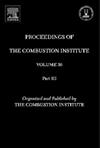A novel projection strategy for manifold-based chemistry reduction models
IF 5.3
2区 工程技术
Q2 ENERGY & FUELS
引用次数: 0
Abstract
The standard Flamelet Generated Manifold (FGM) approach employs a reaction progress variable which is a linear combination of species mass fractions. To find a proper combination for igniting hydrogen diffusion flames, however, is very difficult or even not possible, especially when preferential diffusion is involved. In this regard, this paper presents an FGM method that adopts a subset of the full set of species to describe the movement along the manifold rather than using a reaction progress variable. Moreover, the FGM method is based on an ideal parameterization that spans the local tangential space of the manifold by projecting the solution onto the manifold. This method is referred to as the Projected-FGM method. The method is first tested in a counterflow diffusion flame configuration, and further applied to two reacting mixing layers with and without preferential diffusion effects, respectively. The evaluation of the method’s performance is achieved by comparing the FGM predictions with the results obtained using detailed chemistry. It is shown that the predictions of the Projected-FGM method are in accordance with the results of detailed chemistry simulation for all cases. It is found that with a unity Lewis number approximation, the results are insensitive to the choice of species representing the movement along the manifold, a minimum of two species is adequate. When preferential diffusion is incorporated, more species need to be included. This method is also applicable to other cases where a suitable progress variable is hard to define.基于流形的化学还原模型的新型预测策略
标准的小火焰生成歧管(FGM)方法采用的反应进程变量是物种质量分数的线性组合。然而,要为点燃氢扩散火焰找到一个合适的组合是非常困难的,甚至是不可能的,尤其是在涉及优先扩散的情况下。为此,本文提出了一种 FGM 方法,该方法采用全套物种的一个子集来描述沿流形的运动,而不是使用反应进展变量。此外,FGM 方法还基于一种理想的参数化,通过将解决方案投影到流形上来跨越流形的局部切向空间。这种方法被称为投影 FGM 方法。该方法首先在逆流扩散火焰配置中进行了测试,并进一步应用于分别具有和不具有优先扩散效应的两个反应混合层。通过将 FGM 预测结果与使用详细化学方法获得的结果进行比较,对该方法的性能进行了评估。结果表明,在所有情况下,预测-FGM 方法的预测结果都与详细化学模拟的结果一致。研究发现,采用统一路易斯数近似时,结果对代表流形运动的物种选择并不敏感,至少有两个物种就足够了。当加入优先扩散时,需要加入更多的物种。这种方法也适用于难以确定合适的进展变量的其他情况。
本文章由计算机程序翻译,如有差异,请以英文原文为准。
求助全文
约1分钟内获得全文
求助全文
来源期刊

Proceedings of the Combustion Institute
工程技术-工程:化工
CiteScore
7.00
自引率
0.00%
发文量
420
审稿时长
3.0 months
期刊介绍:
The Proceedings of the Combustion Institute contains forefront contributions in fundamentals and applications of combustion science. For more than 50 years, the Combustion Institute has served as the peak international society for dissemination of scientific and technical research in the combustion field. In addition to author submissions, the Proceedings of the Combustion Institute includes the Institute''s prestigious invited strategic and topical reviews that represent indispensable resources for emergent research in the field. All papers are subjected to rigorous peer review.
Research papers and invited topical reviews; Reaction Kinetics; Soot, PAH, and other large molecules; Diagnostics; Laminar Flames; Turbulent Flames; Heterogeneous Combustion; Spray and Droplet Combustion; Detonations, Explosions & Supersonic Combustion; Fire Research; Stationary Combustion Systems; IC Engine and Gas Turbine Combustion; New Technology Concepts
The electronic version of Proceedings of the Combustion Institute contains supplemental material such as reaction mechanisms, illustrating movies, and other data.
文献相关原料
| 公司名称 | 产品信息 | 采购帮参考价格 |
|---|
 求助内容:
求助内容: 应助结果提醒方式:
应助结果提醒方式:


